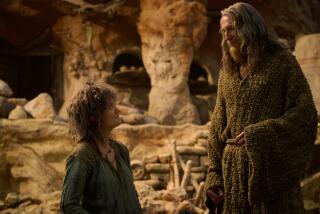An epic secret is out
- Share via
It hasn’t always been this easy to be a Tolkien fan.
For most of my young-adult and adult life, people tended to look at me sidelong should I happen to mention that I had read “The Lord of the Rings” several times -- OK, pretty much once a year since I got my first copies when I was in the fifth grade. Boyfriends especially would grow suddenly still, their eyes wildly scanning the walls for the nearest exit should I suddenly whip out my faux hobbit feet or start speaking in Elvish.
To the uninformed, Tolkien fans occupied the vaguely sinister and decidedly weird regions shared by Dungeon & Dragons players, members of creative anachronistic societies and women who collected flower fairies and unicorn figurines.
Science fiction was a more acceptable obsession: It was masculine, based on science and reason. There were rocket ships and time continuums, things that were possible. Fantasy, on the other had, was just out to lunch. Elves and wizards were girly, hobbits and dwarfs were fey.
It was useless to protest that “The Lord of the Rings” was an epic masterpiece in an age-old scholarly and literary tradition, useless to point out its roots in myth and language. At best, the trilogy was associated with the drug culture of the ‘60s, granted a certain camp credibility like tie-dye and bongs. But for most nonfans, it was considered a big waste of reading time.
Now, of course, all that has changed. Now Viggo Mortenson is on the cover of Vanity Fair for playing Aragorn, son of Arathorn, heir of Isildur, last king of Gondor -- and nobody thinks he’s fey or girly. Now teenage girls in Hello Kitty T-shirts swoon over magazine stories about Orlando Bloom. “Legolas is my favorite,” one sighed at a checkout counter in Target. “I like him even better than Frodo.”
Watching her, all I could think of was how at her age I would have said the word “Legolas” and risked eternal social alienation.
But Peter Jackson and his crew have made literally millions of people conversant in the ways of Middle-earth. Galadriel, Gimli, Saruman, Theoden, Eowyn, Samwise, Treebeard -- not four years ago you took your chances when uttering these names in public. Sure, you might find a fellow fan amid the blank looks, but you’d have to take your business outside the pale -- the park at midnight, certain bars and dark-curtained rooms.
Now, every Tolkien fan I know has come out of the closet, proudly displaying their long-concealed obsession if only to help first-timers understand Jackson’s work. (Dwarfs and elves have a long-standing animosity, that’s why Gimli is so mean to Legolas at first; no, hobbits are not immortal, though they live longer than we do; Faramir is Boromir’s brother and their father is steward, not king, of Gondor.)
Now we can talk about the characters we have loved for so long without people looking at us as if we were about to break out in Entish song. This turn of events is both liberating and unsettling. Yes, any armchair shrink will tell you that secrets beget shame, but in some cases they can engender a feeling of specialness, even superiority. Finding another Tolkien fan always guaranteed hours of conversation, made even more delicious by the knowledge that most people within earshot didn’t know what the heck we were talking about.
As any member of any disenfranchised group will tell you, it’s pretty strange when the mainstream starts speaking your language.
Or actually, not quite. As awesome a work as Jackson’s “The Lord of the Rings” is, it remains, as he has said since the beginning, exactly that: Jackson’s “The Lord of the Rings,” not Tolkien’s. So it’s hard sometimes not to interrupt a movie fan’s rhapsodies with bits of crucial background (one reason Denethor disliked Faramir was because of Faramir’s admiration for Gandalf) or to point out the (many) places in which the film diverges from the books.
This is no doubt annoying to those who are more than satisfied with Jackson’s vision and have no desire to mull the possibility of other choices. They look at us long-standing Tolkien fans with smiles half irritated, half sympathetic. But like people who wore Burberry before it got hot again, we need to stake our claim, to make sure that people know we appreciated the greatness of the work way before New Line even existed.
It’s not that we’re obsessive, it’s just if you’re going to talk about it, you should know....
One friend who asked a few questions about certain characters gave me a queer look when I finished answering. “Well, thanks,” he said. “I get it now. And by the way, you need professional help.”
See, that’s more like it.
More to Read
The biggest entertainment stories
Get our big stories about Hollywood, film, television, music, arts, culture and more right in your inbox as soon as they publish.
You may occasionally receive promotional content from the Los Angeles Times.











